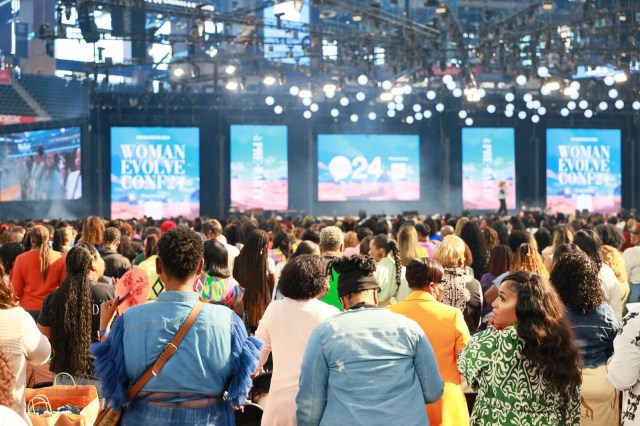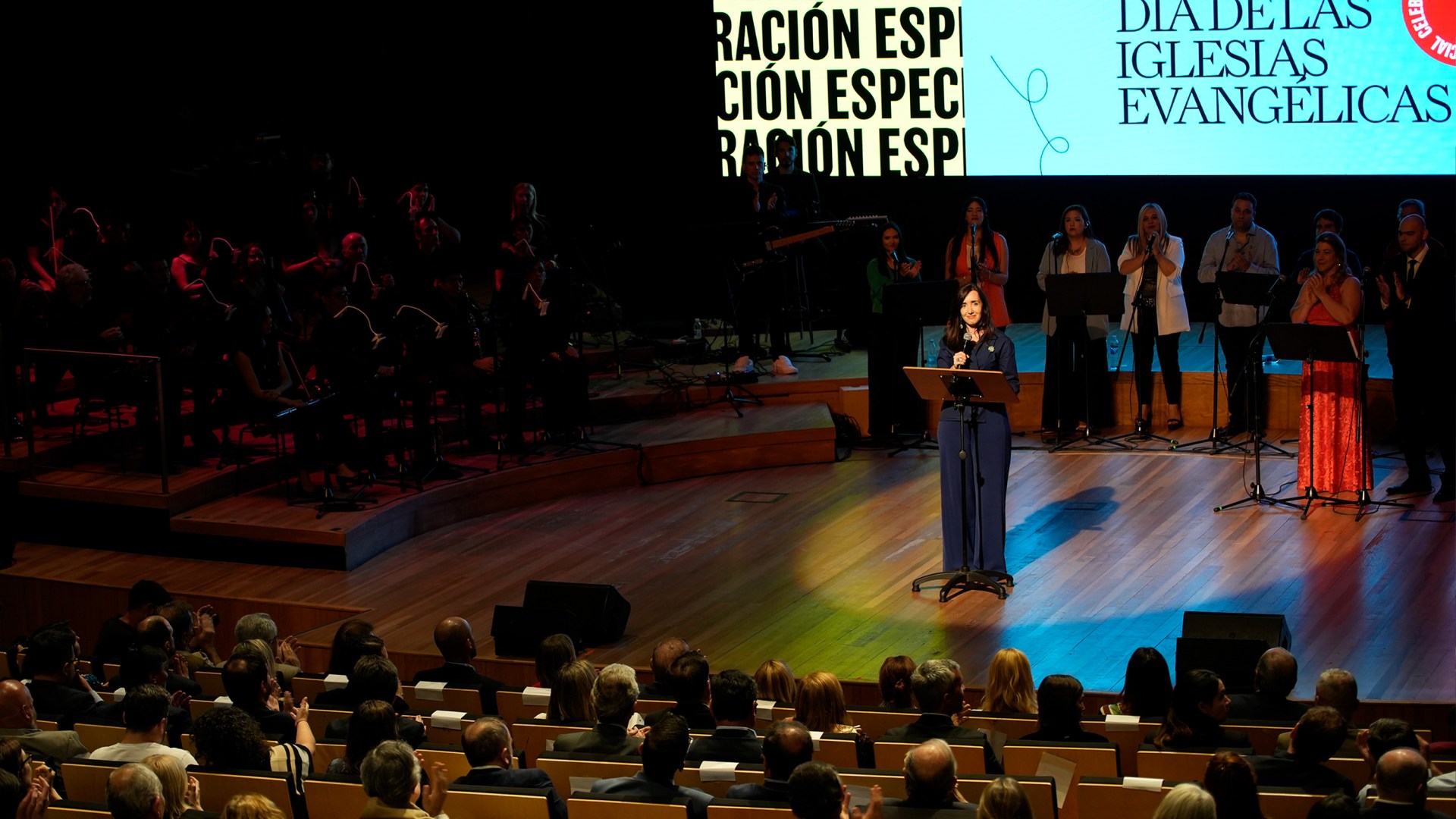Just eight days shy of Election Day, 31-year-old political activist Charlie Kirk addressed a sea of college students in glaring-red MAGA hats at Grand Canyon University, near downtown Phoenix.
Sporting a black T-shirt emblazoned with “xy = man”—a confirmation of where he stands on the GOP’s 2024 litmus test issue—Kirk, who founded Turning Point USA as a college student in 2012, was interrupted as his audience erupted into a rendition of “The Star-Spangled Banner.” Afterward, students grabbed up TPUSA swag that said “Republicans are hotter” and “dump your socialist boyfriend.”
“Gen Z is waking up … and voting,” Kirk posted on X later that day. “WATCH.”
Kirk’s fall 2024 “You’re Being Brainwashed” tour is an effort advertised as a way to help students “challenge left-wing indoctrination on college campuses.” TPUSA has already signed up nearly 800 college chapters, but the event at GCU, established by Baptists but now calling itself interdenominational, is part of Kirk’s recent push to populate evangelical Christian campuses with TPUSA chapters.
Since 2020, TPUSA chapters have appeared at more than 45 Christian colleges or universities, at least 35 of them affiliated with the Council for Christian Colleges and Universities, the largest association of Christian schools. Only 21 chapters at Christian universities appear currently active, however, with even fewer officially recognized by the universities themselves.
Expanding to Christian colleges, some scholars warn, may divide their campuses. The group, whose website says it plays “offense with a sense of urgency to win America’s culture war,” gained notoriety in 2016 for its professor watchlist, which prompted harassment of faculty at secular as well as Christian colleges, who, TPUSA said, “advance leftist propaganda.”
Kirk has disputed the results of the 2020 election, questioned the qualifications of Black pilots, called George Floyd a “scumbag” and said a Bible verse about stoning gay people to death is “God’s perfect law.”
“The Democrat Party supports everything that God hates,” Kirk said at a recent campaign event he organized for Donald Trump. TPUSA did not respond to requests for comment.
Students at Christian colleges who have launched or joined TPUSA chapters said in interviews this fall that the group helps build community and gives them a place to discuss conservative values.
“They say that we are racist and homophobic,” said Payton Stutzman, president of the TPUSA chapter at Liberty University in Lynchburg, Virginia, without specifying who “they” referred to. “We’re really not. We really just want to get together and have a good time. The main things we support is a secure border, a good economy, and the freedom to raise our family the way we think is right. We are not here to push anybody’s beliefs down their throats.”
Sarah Stock, a junior political science major at Vanguard University, a Christian university in Orange County, California, started a TPUSA chapter last fall as an outlet, she said, for political dialogue in what she described as an otherwise apolitical campus.
Last year at a screening of Matt Walsh’s What Is a Woman, a film in which Walsh, a controversial podcast host, talks about transgender issues, approximately 100 students attended. Among them was a group of friends who came up to debate the TPUSA members during a Q&A session.
“We all were like, I respect you have this opinion, and it’s great that we can talk about it,” said Stock, who said that after momentarily growing tense, the two groups ended up laughing together. “It was just this mutual understanding that you can love other people and still disagree with them.”
Generally operating in more conservative environments, TPUSA chapters on Christian campuses face less opposition than peers at secular universities but aren’t exempt from controversy. In 2023, Whitworth University put their TPUSA chapter on probation after a free speech event encouraged students to write whatever they wanted on a beach ball, vulgarities included. A year earlier, a now-defunct TPUSA chapter at Calvin University in Grand Rapids drew backlash after advertising a Kanye West-themed event in the wake of West’s antisemitic comments.
“The tone of TPUSA social media, and the tone of Charlie Kirk’s rhetoric, to me, it seems there’s a conflict there between kind of that brand, and the more thoughtful political discourse that Christian colleges historically have been working to cultivate,” said Kristin Kobes Du Mez, professor of history and gender studies at Calvin University.
Since TPUSA launched its Faith Initiative in 2021, which partners with churches to host religious conferences, Kirk’s rhetoric about “reclaiming the country for Christ” has grown more bold, earning Kirk the label of Christian nationalist.
“If the church does not rise up at this moment, if the church does not take its proper role, then the country and the republic will be gone as we know it,” Kirk said at a May 2021 TPUSA Faith event at Dream City Church in Phoenix.
Kyle Spencer, whose 2024 book Raising Them Right chronicles America’s conservative youth movement, is unequivocal in describing Kirk as a Christian nationalist, but political commentator Isaac Willour, a graduate of the Christian Grove City College, called it an “obvious jump” to conflate “those who have a pop interest in TPUSA talking points” with “the actual radical right.” TPUSA, he noted, has distanced itself from radical conservatives such as Nick Fuentes and Morgan Ariel.
“There’s a very easy trap to fall into … that advocating for Christians who meaningfully use any kind of political process, anything that’s not really quietism, is Christian nationalism,” said Willour.
Stock said, “It seems like there’s a high demand for Christian nationalism in the media, but I think there’s a pretty low supply of it.”
Before TPUSA Faith, there was the Falkirk Center for Faith and Liberty, a think tank located at the evangelical powerhouse Liberty University in Virginia. The brainchild of Kirk and then-Liberty President Jerry Falwell Jr., the center, founded in 2019, brought Trump allies such as Eric Metaxas and Rudy Giuliani to campus but ultimately lost steam as Falwell encountered scandal and eventually resigned.
Kirk’s legacy lives on in the school’s TPUSA chapter, which ballooned from 175 members over the summer to over 600, according to Stutzman, crediting the election. (He also touts its pickleball, trivia and Shrek-themed “drain the swamp” movie nights.) Voter registration has been a top priority.
“Right now, Virginia is in a spot where it could flip,” said Stutzman, who was doorknocking for the Trump campaign as he spoke to RNS. “While we can’t endorse anybody, we can support our values, and we can work with college Republicans and other clubs that can endorse people, and we can provide them resources.”
Many TPUSA Christian college chapters have hosted debate watch parties and have plans for election night gatherings. At Liberty, local and federal politicians are expected to attend the chapter’s formal election night gala.
JJ Glaneman, a sophomore at Duquesne University, a Catholic university in Pittsburgh, told RNS he’d also recently been doorknocking for Trump and GOP Senate candidate David McCormick.
Duquesne’s TPUSA chapter is unofficial. After attending TPUSA’s multi-day AmFest event in Arizona in December 2023, Glaneman filed to start a formal chapter in January but was denied by student government, who, Glaneman said, cited TPUSA’s values. Instead, Glaneman has co-founded a chapter of the 132-year-old College Republicans that they use as a “shield,” he said, to host conservative events on campus.
According to Matt Boedy, a professor of religious rhetoric at the University of North Georgia, TPUSA’s “star-studded” conferences, big-name speakers and viral political debates make TPUSA a more attractive option than a College Republicans chapter.
There’s also TPUSA’s funding. Tax filings from June 2023 showed that TPUSA took in $81.7 million, up from $2.05 million in 2015. Stock said that while her group could apply for “like $50 a year” from Vanguard, “we just get everything from Turning Point.”
Claire Bettag, a senior at St. Mary’s Notre Dame, said the Indiana Catholic school denied her attempt to found a chapter in 2022 due to TPUSA’s messaging on LGBTQ issues. Despite the rejection, Bettag has maintained an unofficial TPUSA chapter and a College Republicans club at the school and said TPUSA encouraged her to speak out when St. Mary’s decided to offer open enrollment to applicants “who consistently live and identify as women,” which included transgender students.
“We had met with the school board, the president, the vice president of the college, and we started multiple protests and did a lot of activism to get this policy reversed,” said Bettag. “I have confidence now to speak out about my conservative values that I never thought that I could ever have, and it’s because Turning Point really backed me up along the entire process.”
Saint Mary’s reversed its decision a month later, by which time, Bettag said, her unofficial TPUSA chapter had grown to 75 members.
Catholic University of America has also been hesitant to welcome TPUSA to its campus, as have some Protestant colleges. In 2021, Point Loma Nazarene University, a Church of the Nazarene school in San Diego, and Taylor University, an evangelical school in Upland, Indiana, said the national group conflicts with their mission statements.
The Grand Canyon University event shows that TPUSA’s efforts to enroll Christian students aren’t slowing down, and while Spencer said it’s still a question whether the campaign will translate to votes, Stutzman, at Liberty, said not all gains are political.
“Ultimately, at the end of the day, it’s not just political warfare,” he said. “It’s spiritual warfare that we’re fighting as well.”




















































